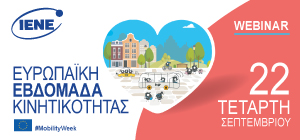The important developments concerning e-mobility were discussed during the web conference on "Electric Mobility and Smart Cities", organized by the Institute of Energy for South-East Europe (IENE) on 22 September 2021, which took place as part of the European Mobility Week, and was sponsored by Hellenic Petroleum. The developments around electric mobility and the promotion of new innovative technologies of "smart" means of transportation were discussed at length at the Webinar, while special emphasis was given to the issues arising from the introduction of electric vehicles in the Greek market and beyond.
IENE’s online conference was opened with introductory remarks by the Chairman and Executive Director of the Institute, Costis Stambolis, who pointed out that e-mobility is an area with a wide range of applications related to a broad grid of electric vehicles. "The issue is not just to increase the number of electric vehicles, which is of course a legitimate goal, but to focus on how the quality of life in urban and sub-urban centers can be improved in general, and how the existence of an expanded electricity network can help", said Stambolis.
Taking the floor, Ioannis Tselikis, Head of e-Mobility Office of the Ministry of Environment and Energy and Special Advisor to the Secretary General of Energy and Mineral Resources, referred to the Ministry’s policies and for the promotion of electrification. According to the data presented, electric mobility in Greece is developing at a satisfactory pace, while charging infrastructure and market development have been launched. As Mr. Tselikis stated, "in July 2021, the market share of electric vehicles reached 5.53%, a percentage which covers the 101% growth annual target of the National Energy and Climate plan. In fact, in the second quarter of 2021, registrations were nine times more than in the corresponding quarter of 2020". Regarding the charging infrastructure, Mr. Tselikis pointed out that "we have reached the European target of one charger per ten vehicles, while in 2021 further steps are expected to take place as more and more players enter the field of public charging”. Already in the first eight months of the year, the publicly accessible charging points have more than doubled".
This was followed by the intervention of Dr. Eva Nanaki, executive of the Department of Alternative Energy Sources and New Technologies of Hellenic Petroleum SA and research associate of Aarchus University, who presented the prospects for the development of e-mobility and "smart" cities in Greece. "E-mobility in recent years has experienced an explosive growth at European and global level and it represents a mature and attractive alternative to conventional vehicles. "Smart cities can integrate e-mobility into urban centers with their various technologies," she said.
From his side, Dr. George Ageridis, Head of the Energy Efficiency Division at the Center for Renewable Sources and Energy Saving CRES), presented the policy for e-mobility in the Greek energy environment. Referring to the prospects of e-mobility, Mr. Ageridis said that "there are a number of fields of use and a number of possibilities to engage e-mobility in the energy chain. Their utilization contributes to the formulation of a policy of electrification of transport having as a goal the decoupling from imported fossil fuels, a parameter particularly critical for Greece, the extensive utilization of local energy potential, network stability, and the creation of domestic added value in world-class cutting-edge fields."
Anastasios Matikas, E-Mobility Business Development Manager at Hellenic Petroleum SA, presented the technical challenges for the development of e-mobility, expressing optimism for the prospects of the sector, stating that "I am optimistic about the future of e-mobility in Greece, as there is strong political will and serious work is being done at legislative level". At the same time, he noted that "while until recently there was a delay compared to the rest of the European Union in terms of investment in the expansion of the charging network of electric vehicles, now significant steps are being taken in this direction."
The meeting ended with the intervention of Stamatis Asimis, Key Projects & New Technologies Manager at Sunlight SA, Greece’s leading battery manufacturer, who spoke about the role of energy storage systems in sustainable e-mobility and "smart" cities. "Currently, the market for rechargeable batteries is projected to more than double by 2030, with lithium-ion batteries, which have an increased lifespan and fast charging capability, gradually replacing lead-acid batteries. "Lithium-ion batteries can make a significant contribution to the creation of charging facilities for electric vehicles, as well as systems for 'smart' homes, 'smart' businesses and, in general, 'smart' cities."




